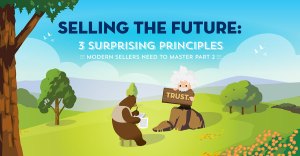Selling the Future: 3 Surprising Principles Modern Sellers Need to Master, Part 2



A recent survey found that 59% of people block unwanted phone calls or texts, 75% say they receive too many emails from brands, and 69% say this behaviour has caused them to unfollow brands on social channels. So how can modern sellers like your break through?
“Who HATES IT when another human being calls them on the phone?”
This was the simple but powerful question the perennial straight shooting Gary Vaynerchuk asked a New York City audience of 1,500 sales and marketing leaders at the Sales Machine conference back in June of 2016. Like many, I was first taken aback by the question. “What does he mean?” I thought. “Who’s calling? A friend? My mother? A telemarketer asking if I’m interested in massive long distance savings?” But as 40% of the audience sheepishly raised their hands (including myself), I realized my questions no longer mattered. Indeed, the world has changed.
In my last post, I introduced the first of three principles that modern sellers need to master if they wish to continue to thrive and meet the changing needs of their buyers; disrupting buyer inertia. The second one is directly related to the assertion that, in a time where we’re constantly being bombarded with marketing messages, time itself has become our most precious commodity. And we’ve become fiercely protective of it.
In fact, a recent survey found that 59% of people block unwanted phone calls or texts, 75% say they receive too many emails from brands, and 69% say this behaviour has caused them to unfollow brands on social channels. So how can modern sellers like your break through?
Selling the Future Principle #2: The Massive Conversion Power of Advocacy
In a world were customers struggle to make sense of the multitude of marketing messages and the seemingly infinite product choice they’re exposed to, modern buyers have recoiled, and now disproportionately seek the counsel of trusted sources. So who do they trust? Vendors? Analysts? To answer that question, think about the process you go through when you’re looking to book a vacation at a place you’ve never been to before. You might first visit the property’s website, but within moments you’re checking out reviews on websites like TripAdvisor and reading comments on AirBnB.
Not surprisingly, recent studies have shown that recommendations from people like ourselves reign supreme when it comes to driving purchasing decisions. B2B sales data from Salesforce corroborates this trend. It demonstrates that when it comes to lead conversion, interest that originates from customer and employee referrals do so at rates fifty times higher than email campaigns! This means that one of the most unobtrusive, empathetic, and authentic ways to convert prospective buyers is to surround them with like-minded customers who love you.
Want to know how your organization is doing on that front? Try this simple test. Go to Google (or your favourite search engine) and type “[Your Company Name] reviews” and see what comes up. Do you see recommendations on trusted review sites? Perhaps Glassdoor reviews highlighting your innovative culture? What about your own personal social profile? Does you digital footprint demonstrate to a prospective customer that you and your organization can help them?
In a world where customer engagement is the new marketing, organizations need to mobilize their advocates to generate the social proof and high intent leads that convert at the speed of trust.
Curious to learn about principle number three? Stay tuned for the third and final part this post in the coming weeks.
In addition, this spring I’ll be keynoting a series of Salesforce events across the country that will help guide sales leaders through the challenges of the modern buying landscape. These events will not only provide deeper insights into these three principles but also tips and tactics to operationalize them in your own business. Be sure to join me and register for these FREE events. Space is limited to best to register early!


















